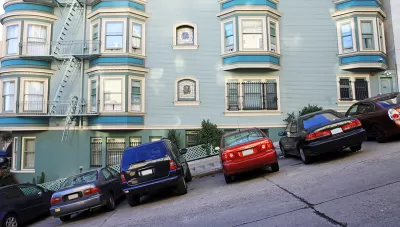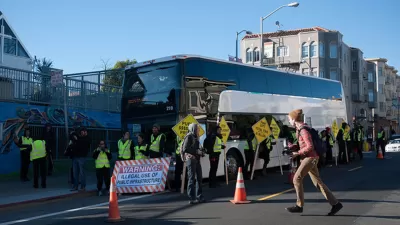Something strange is taking place in the City by the Bay. It's not just experiencing a growth in carless households—carless households are actually replacing those with cars.

We've read that driving has been declining and that Americans are owning fewer cars, particularly among Millennials in major urban centers. Nowhere in the U.S. may this be more true than in San Francisco.
"Between 2000 and 2012, the city has seen a net increase of 11,139 households, and 88 percent of them have been car-free. That’s according to an analysis of U.S. Census data by Michael Rhodes, a transportation planner at Nelson\Nygaard and a former Streetsblog reporter," writes Aaron Bialick, editor of Streetsblog San Francisco.
This is not the result of an increase in housing without parking, though at least one, 12-unit apartment building planned without parking has been proposed in the Mission District as we noted two years ago (based on an article by Bialick). Rather, it's evidence that building housing without parking will attract households without cars.
The increase in carless households also results from existing households shedding cars, perhaps made possible by "expanded bike lanes, car-share services, and improved taxi service (besides the new 'ride-share' apps like Uber and Lyft)," according to Livable City Executive Director Tom Radulovich. He also notes that "Muni, BART, and Caltrain ridership have also increased to record levels over the years."
And then there are the notorious tech buses and shuttles (that many San Franciscans love to blame for the city's gentrification) that enable car-free living.
The next change will hopefully be in the city's planning department, if they greenlight carless housing.
FULL STORY: Car-Free Households Are Booming in San Francisco

Maui's Vacation Rental Debate Turns Ugly
Verbal attacks, misinformation campaigns and fistfights plague a high-stakes debate to convert thousands of vacation rentals into long-term housing.

Planetizen Federal Action Tracker
A weekly monitor of how Trump’s orders and actions are impacting planners and planning in America.

Chicago’s Ghost Rails
Just beneath the surface of the modern city lie the remnants of its expansive early 20th-century streetcar system.

Bend, Oregon Zoning Reforms Prioritize Small-Scale Housing
The city altered its zoning code to allow multi-family housing and eliminated parking mandates citywide.

Amtrak Cutting Jobs, Funding to High-Speed Rail
The agency plans to cut 10 percent of its workforce and has confirmed it will not fund new high-speed rail projects.

LA Denies Basic Services to Unhoused Residents
The city has repeatedly failed to respond to requests for trash pickup at encampment sites, and eliminated a program that provided mobile showers and toilets.
Urban Design for Planners 1: Software Tools
This six-course series explores essential urban design concepts using open source software and equips planners with the tools they need to participate fully in the urban design process.
Planning for Universal Design
Learn the tools for implementing Universal Design in planning regulations.
planning NEXT
Appalachian Highlands Housing Partners
Mpact (founded as Rail~Volution)
City of Camden Redevelopment Agency
City of Astoria
City of Portland
City of Laramie



























